'The club was finished' - inside Sunderland's TV drama
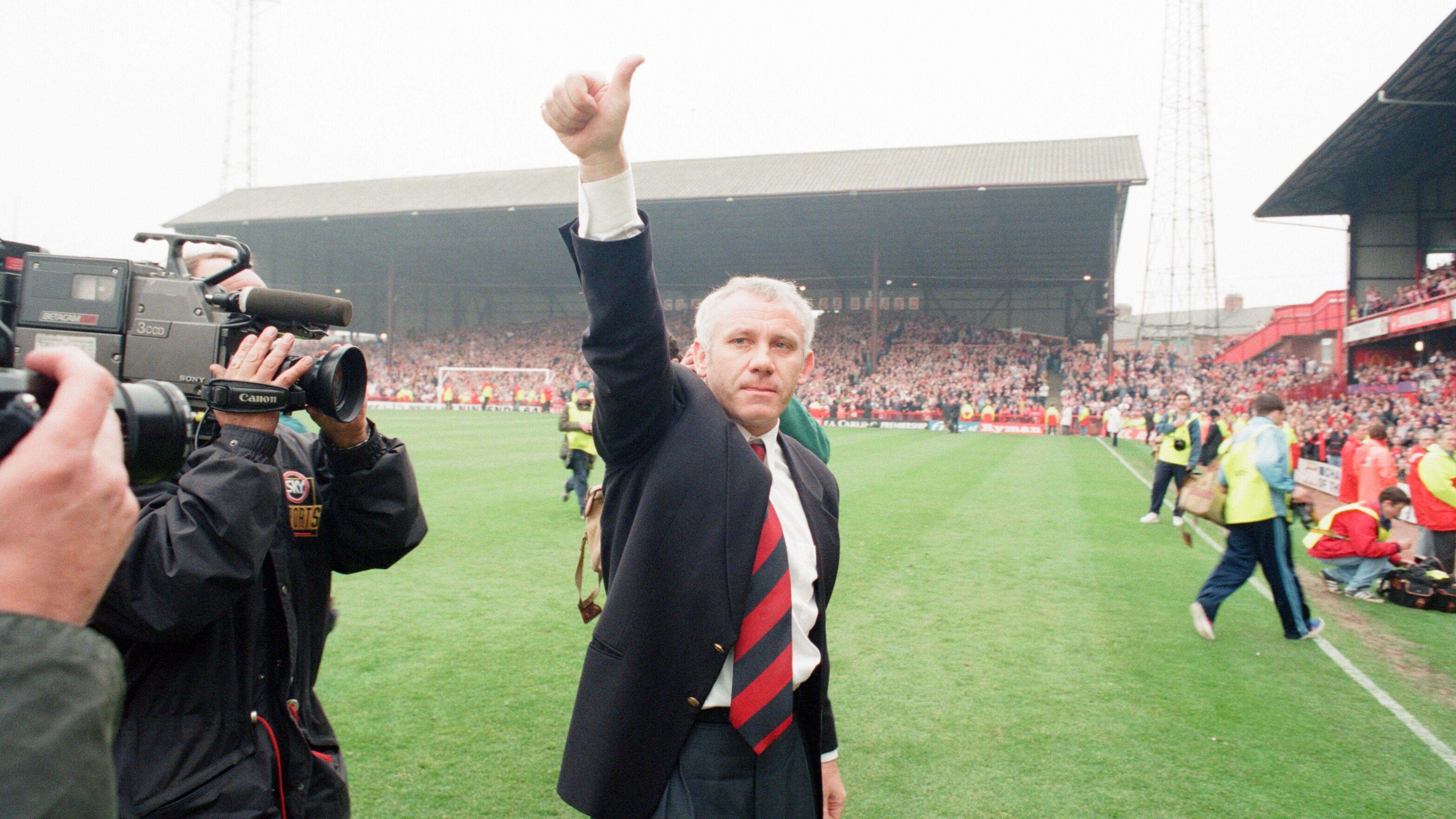
Peter Reid acknowledged the club's fans following the final league game at Roker Park
- Published
Sunderland's return to the Premier League has rekindled memories of a revelatory television series documenting the club's turbulent 1996-97 campaign. It was a venture that would capture the changing face of football while ending in heartache.
"Men against boys," railed an incensed Peter Reid as his Sunderland side trailed visitors Wimbledon by two goals at half-time of their December 1996 match.
"All over the pitch. Weak," he continued, storming out of the dressing room after telling his charges to "get on with it".
Only a few minutes into the first episode of Premier Passions, the expletive-filled diatribe provided an eye-opening introduction for viewers of BBC One.
"Every now and then you've got to get into players," Reid says today of that rant. "But if you did it every week it wouldn't work. I'm not that stupid.
"Even though it looks pretty brutal, I still have a laugh about it with the lads when I see them.
"I don't think it would be acceptable nowadays. I think society's changed if I'm honest, but them days - listen, it happened to me as a player. I'm not saying it was the norm, but it did happen."
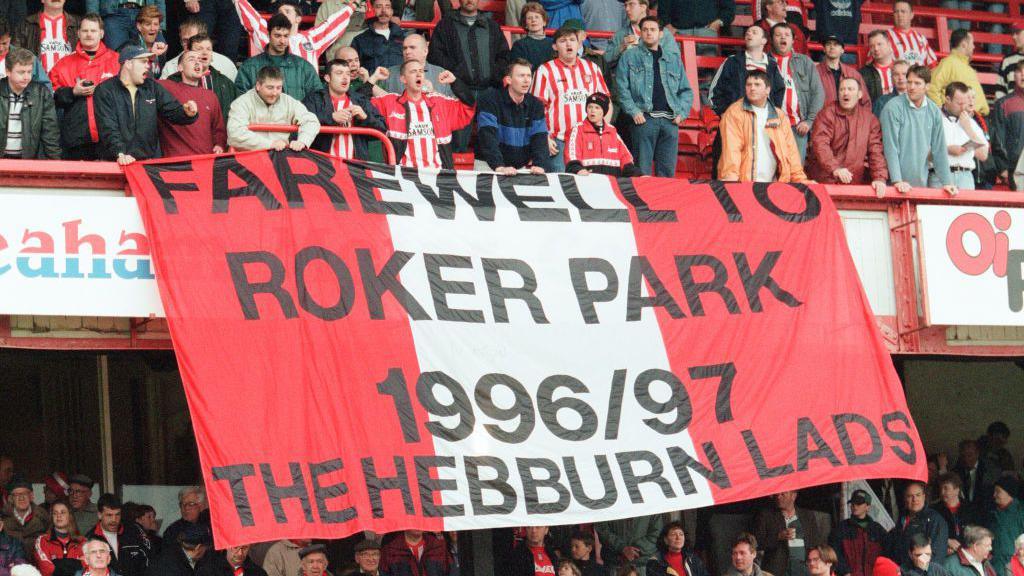
The club's farewell to Roker Park after 99 years was a major theme of the season
As the club prepared to leave its beloved Roker Park home after nigh-on a century, the series - broadcast in February and March 1998 - also detailed efforts to capitalise on the commercial possibilities opening up as the game's top flight, then known as the Premiership, exploded in popularity.
When a letter from the BBC proposing the production landed on the desk of Lesley Callaghan, the club's head of PR, she and the board saw it as an opportunity to document a "historic moment".
"It felt like something important was happening with the growth of the Premier League, TV deals and construction of new grounds after the Taylor report [into the Hillsborough tragedy]. It was a chance to be part of that.
"We all felt there would never be a bigger story to tell. Everyone was working hard for the club and the city."
Sir Bob Murray CBE, chairman at the time and now life president, says it was a chance to mark "a new beginning", with the club floating on the London Stock Exchange to raise funds for the Stadium of Light - being built at Monkwearmouth where blackened miners had toiled for decades before their colliery was closed.
"It was a very testing time. There was no future at Roker Park. It was difficult for people to comprehend because of the emotion attached to it, but I knew it.
"We only turned over about £4m and were losing money. Although Roker had a capacity of about 22,500, we only sold out that season against Manchester United and Newcastle. There was no training ground.
"The club was finished as an operation. It needed to be fixed. The series was a chance to increase its profile."
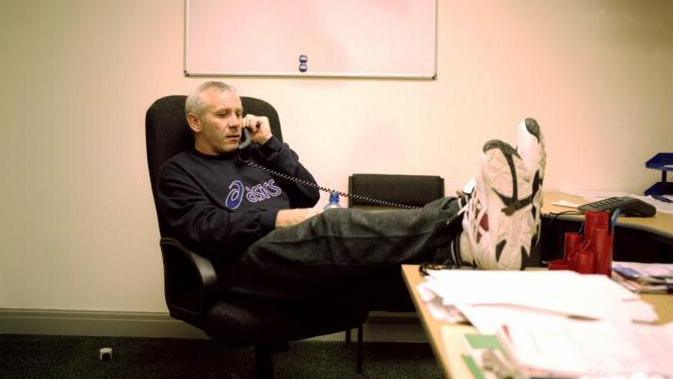
The camera crew frequently filmed Reid in his office as he discussed club developments
There to cover those storylines on behalf of the BBC - which had full editorial control - was director John Alexander, born only a few miles away in the County Durham town of Peterlee.
"The people I was working with presumed Sunderland would be my club," he explains. "The thing is, I didn't know much about football.
"But it's so much a part of that area that I said I'd love to do it because I knew it was never just going to be about the sport. It was about the place, the fans and everything else."
Initially wary of allowing cameras into the sanctum of the dressing room, Reid says his misgivings soon disappeared.
"They were a good crew, great lads. Some of the bits they show of me getting into the players are because it makes good TV, I should imagine.
"There were other times when I'm quite measured and tactically thoughtful, [but] it just shows you where I get into them.
"You do form relationships. They got to know when to come and see me and when not to," he adds with a laugh.
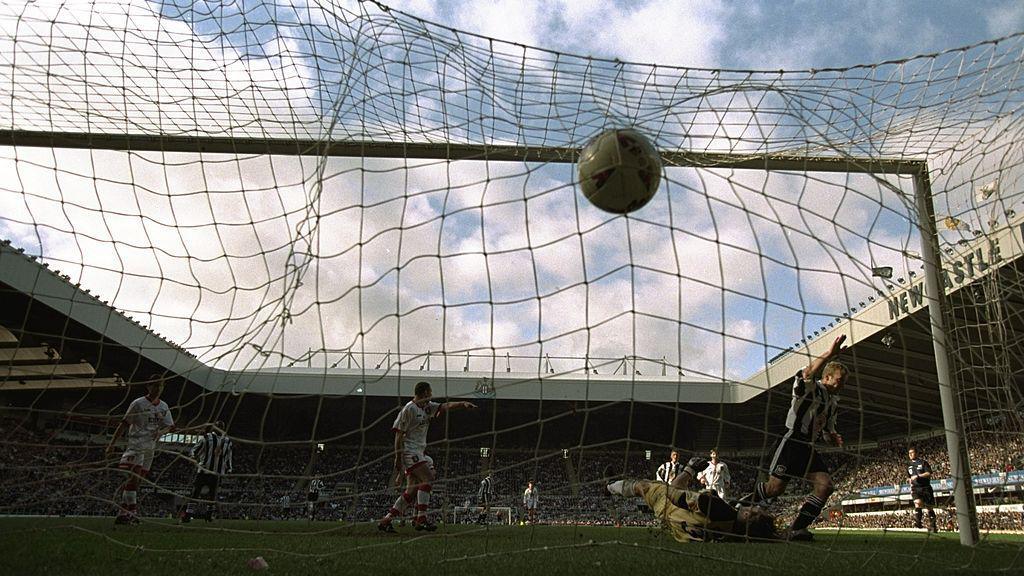
An Alan Shearer equaliser meant Sunderland could only take a point from a tense derby at St James' Park in April 1997
For his part, Alexander remembers a game of "cat and mouse" with the manager who he felt perhaps "didn't want to be put under the microscope".
"I met Peter and he was great, telling us we could have whatever we wanted.
"The first week we said 'to make things as easy as possible, we'll put a mic on your overcoat so we won't have to interfere with you'. Of course, he didn't put his coat on.
"Then half-time comes at a game and we've been promised we can go into the team talk. We walked to the door and literally within 10 seconds he said 'you lot can [get out] for a start'."
Leading a small crew comprising two researchers, a cameraman and sound expert, Alexander realised "this can't go on, you've got to trust us".
"After that we had to have a conversation, saying if we didn't get the access it really wasn't going to work and we weren't out to stitch him up.
"I remember him saying: 'The thing is, I hope you're not just going to have me effing and jeffing the entire time.'
"Well," Alexander adds with a good-natured chuckle. "If you've seen the team talks, what was I supposed to do?"
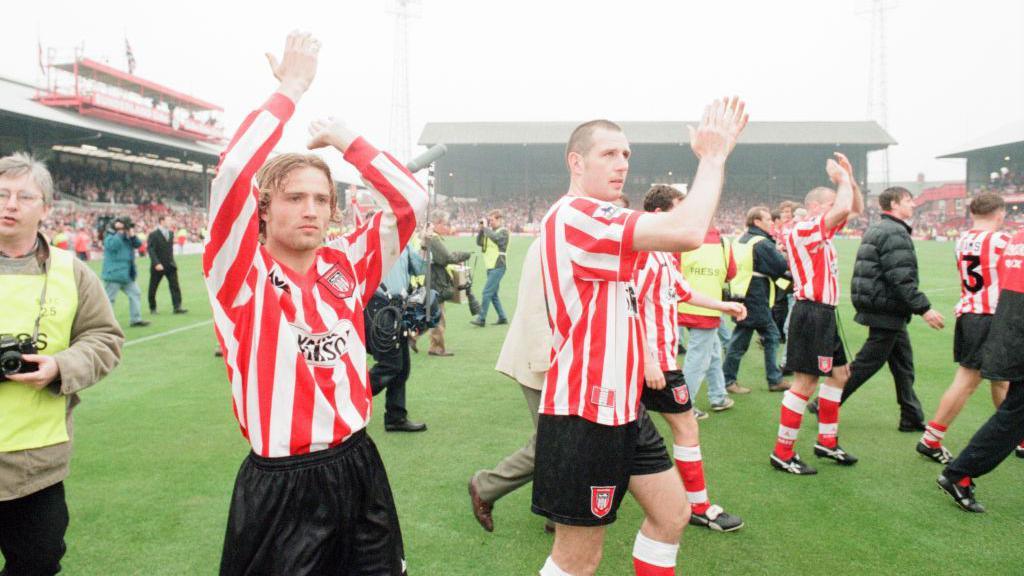
Victory in the final game at Roker Park gave the club hope of avoiding the drop
Picking up in December 1996 with the club mid-table, the 50-minute episodes also featured staff and fans as Sunderland slid towards the bottom three, hampered by the loss of record-signing Niall Quinn and new goalkeeper Tony Coton to injuries.
"As the weeks went on the results began to take a bit of a nosedive," Alexander says. "But there was a certain point where everyone realised there was no going back.
"And actually everyone began to see this was an opportunity to show people their commitment when things were going against them and that decisions weren't quite as the fans perceived from the outside. In the end, that transparency worked well."
Approaches for forwards Ronen Harazi - jokingly referred to as 'RoboCop' because of a metal rod in his leg - and Jon Dahl Tomasson proved fruitless, while a late-season deal for Chris Waddle was branded a "panic buy" by a supporter on camera.
Keen to show they had not lacked ambition, boardroom scenes saw deputy chairman John Fickling run through a list of missed targets including Rangers' Paul Gascoigne and Manchester United's Andy Cole and Paul Scholes.
Reid admits those enquiries were non-starters.
"You throw names into the pot from the scouting side, but Alex [Ferguson, Manchester United manager] wasn't having it."
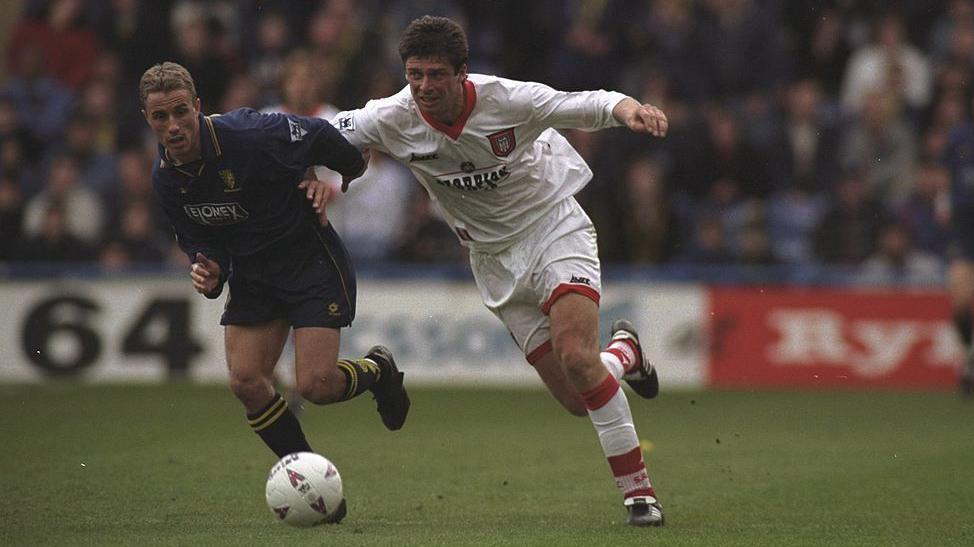
Despite striker Niall Quinn's late-season return, a 1-0 loss to Wimbledon on the final day sealed Sunderland's fate
Murray acknowledges "there was no money spare".
"Building a stadium like we did, you haven't got funds rushing around [for players]. You've got banks and building contracts having to be paid. There was massive cash outflow every month."
Sunderland's battle went to the final day of the season.
But their fate would be decided by another meeting with Wimbledon and a 1-0 loss at Selhurst Park saw them tumble back into the First Division a year after being promoted as champions, despite their 40-point tally - a then-record.
It left Reid, twice a league winner in his playing days with Everton, "shell-shocked".
"I'm not stupid. I had a few sleepless nights worrying about it and I was conscious of the share price, but I always thought we had a good chance [of escaping]."
When the time came for an advance screening, Callaghan, who later became a club director, travelled to a BBC base in London with Murray and Fickling where the trio dispensed with the buffet such was their eagerness to watch all five episodes.
"People take the mick out of Bob for the boardroom discussion about gold taps for the executive toilets," she says. "But he laughed along in the same way as the fans."
Featuring a voice-over from Peterlee-born actress Gina McKee, the musical accompaniment was a church-like choral arrangement in a nod to supporters' viewing the sport as akin to a religion.
With the club's relegation, it was composed as a requiem, Alexander confirms.
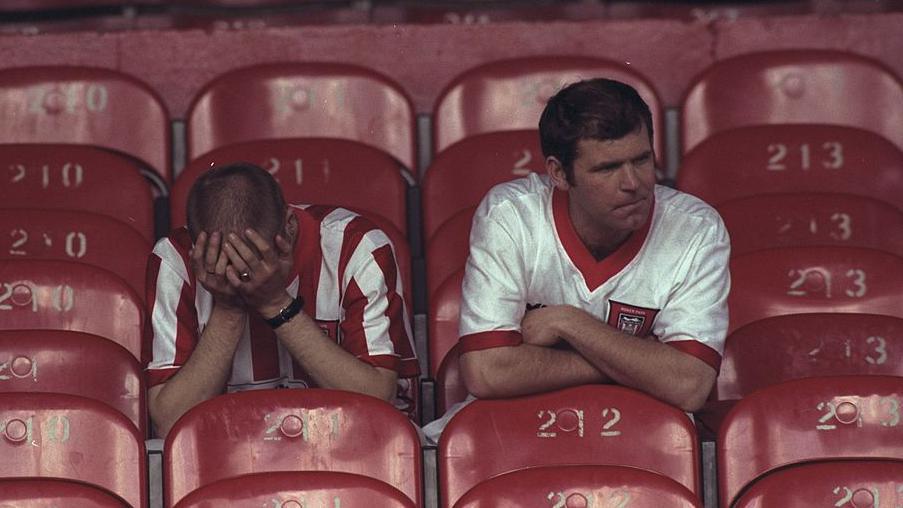
The club's fans were left dejected by the drop back into the First Division
When the series was broadcast in an after-the-watershed slot, Reid says his players - and family members - tuned in.
"The lads hammered me. I got plenty of stick, put it that way.
"The only time I got into trouble was with my Auntie Mary, God rest her soul, who was a staunch catholic. It's fair to say she gave me a [telling off] for my language."
All involved say they look back fondly on the production and praise its impact in helping the club reach new groups of supporters.
While Roker Park's stands were often half-full, today there is a waiting list for Stadium of Light season tickets despite the ground's 48,000 capacity.
Liverpudlian Reid again led Sunderland to promotion in 1999 as well as two seventh-placed finishes in the top division before departing in October 2002.
But he suggests the campaign featured in Premier Passions was "possibly the best achievement" given the limitations and youthfulness of the squad.
"It was a brutal league and it caught up with us. It was just a matter of battening down the hatches and trying to dig our way out of it," he reflects.
"They gave me everything they had and were absolutely magnificent. You can't ask for anything more."